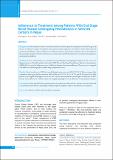Please use this identifier to cite or link to this item:
https://hdl.handle.net/20.500.14356/1008| Title: | Adherence to Treatment among Patients With End-Stage Renal Disease Undergoing Hemodialysis In Selected Centers In Nepal |
| Authors: | Sapkota, Abja Sedhain, Arun KC, Tulza Sigdel, Surendra Subedi, Sulav |
| Citation: | SapkotaA., SedhainA., KCT., SigdelS., & SubediS. (2022). Adherence to Treatment among Patients With End-Stage Renal Disease Undergoing Hemodialysis In Selected Centers In Nepal. Journal of Nepal Health Research Council, 20(01), 72-78. https://doi.org/10.33314/jnhrc.v20i01.3828 |
| Issue Date: | 2022 |
| Publisher: | Nepal Health Research Council |
| Article Type: | Original Article |
| Keywords: | Adherence ESRD-AQ hemodialysis treatment |
| Series/Report no.: | Jan-March, 2022;3828 |
| Abstract: | Abstract Background: Hemodialysis remains a commonly available treatment option for many patients with end-stage renal disease. In addition to regular hemodialysis, these patients require regular use of medicines, follow fluid restriction and dietary modification. Hence, adherence to treatment remains a major factor to improve survival and quality of life among these patients. Therefore, this study was carried out to identify the adherence to treatment among patients undergoing hemodialysis. Methods: A cross-sectional study was conducted among 160 patients undergoing hemodialysis at three centers of Bagmati province of Nepal from July to December 2020. We used End-Stage Renal Disease Adherence Questionnaire (ESRD-AQ) to record the adherence scores in different domains of treatment adherence. The scores were compared with different sociodemographic variables using nonparametric tests. Results: Out of a total score of 1200, the overall obtained mean score was 1084.07±125.58. The percentage of the respondents adhering to dialysis, medicines, fluid, and diet was 91.9%, 76.3%, 48.9%, and 43.0% respectively. Male patients scored significantly higher score in the diet. And the married patients scored higher in adherence to fluid. Patients with middle socio-economic status scored significantly higher score in adherence to hemodialysis treatment. Conclusions: More than half of the respondents were non adherent to fluid and diet. Periodic motivation by health care professional and dietary counseling by dietitians might be helpful to improve the adherence to treatment. Keywords: Adherence; ESRD-AQ; hemodialysis; treatment. |
| Description: | Original Article |
| URI: | http://103.69.126.140:8080/handle/20.500.14356/1008 |
| ISSN: | Print ISSN: 1727-5482; Online ISSN: 1999-6217 |
| Appears in Collections: | Vol. 20 No. 01 (2022): Issue 54 Jan-March, 2022 |
Files in This Item:
| File | Description | Size | Format | |
|---|---|---|---|---|
| 3828-Manuscript-27870-1-10-20220606.pdf | Fulltext Download. | 219.54 kB | Adobe PDF |  View/Open |
Items in DSpace are protected by copyright, with all rights reserved, unless otherwise indicated.
